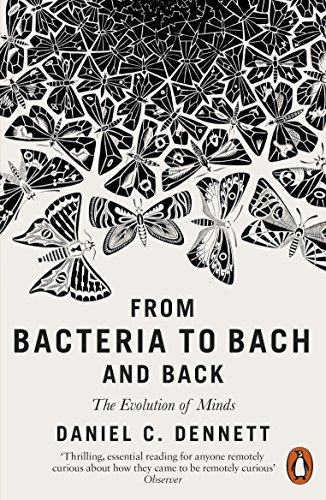معلومات عنا
دعم العملاء
احصل على التطبيق

قم بتوجيه الكاميرا لتنزيل التطبيق
حقوق الطبع والنشر © 2024 Desertcart Holdings Limited


From Bacteria to Bach and Back: The Evolution of Minds
L**A
Misleading Title
The book is well written and it's very interesting read. I found however that the book dealt very little with actually the evolution of minds and consciousness. Half, if not more of the book is paraphrasing Richard Dawkins's material found in his books: The Selfish Gene and the Blind Watchmaker or otherwise Pedro Domingo's Master Algorithm. There's some insight onto consciousness and evolution but treated very superficially, his ideas should be elaborated more and have a wider set of examples and cover a more significant part of the book, instead he created a literature review of theory related to natural evolution, language evolution and machine learning but not a coherent argument for his theory of "The evolution of minds" as the titled alluded.
J**U
Difficult read
As a curious reader, I can responsibly say this book was not written for the general public. Make no mistake, there must be life-changing insights throughout the book, as apparently this is some kind of a thesis built on the author’s life-long quest on the topic. The problem is, for someone not in the field of linguistic or biological philology (I made these terms up but you know what I mean), it’s just not a very enjoyable or rewarding experience reading pages and pages of:“Perhaps somewhat in response to this criticism, Chomsky (1995, 2000, 2000b) dramatically revised his theory and has since defended the minimalist program, which discards all the innate mechanisms and constraints of his earlier vision and proposes that all the work they were designed to do could be accomplished by just one logical operator, called Merge. “ (p. 277)The truth is, at least half of the time I felt like reading some journal article, which demands full attention on each and every word in print, and perhaps a little research into those you don’t understand after a second reading. But how many of the even intellectually curious readers care to do such things at 9pm after a day’s work? Again, I’m only speaking for (lazy) people like myself.
S**N
The Payoff for Learning Dennettish
I've been putting off reading Dennett for years. I'm glad to have finished this valuable but frustrating book.Like: Good summary of Dennett's views and related literature. Some powerful ideas - I particularly liked the proposal that our brains do a recursive loop to construct an image of reality, the image we are conscious of, in the form of things with abstract properties, by projecting expectations of expectations.Frustrations: I found Dennett's style to be really hard going. There's not much hand holding. Who he's writing for oscillates. He doesn't do simple summaries ('for nine year olds') to keep you on board. There isn't a glossary and hardly any graphics. He expects you to learn to speak his abstract language of 'discriminations' and 'affordances' instead of using more common terms. The good thing is that there was a payoff.
E**H
Dennett draws together decades of his thinking
Some years ago I found that the trio of Dawkins, Dennett and Blackmore captures my particular zeitgeist with respect to memes, free-will and consciousness, so I was disposed to read this with a positive though not uncritical eye. For me, Dennett's writing sits between popularly accessible and rigorously academic. Reading it is an effort well worth it for the layman who wants to understand a cogent and coherent attempt at explaining - in this case - the phenomenon we call consciousness. This book draws on threads and metaphors he has developed over the years - the cranes and skyhooks are here - and updates his meme-oriented characterisation of the mind. Dennett's style leads the reader to engage with his analogies and metaphors without suspending their own scepticism and without having to accept this as some final version of The Truth. It is an enlightening and purposeful step on the road to being able to conceive how to talk about the phenomenon of consciousness, firmly rejecting the self-defeating dualism of Descartes. It does not provide The Answer, but my goodness it leaves you better-equipped to think more sensibly and consistently about the subject.
A**Y
An author's attempt to explain something he does not understand. But buy the book anyway!
Hard to know where to start.I guess if you are already fixed in your mind - and believe that mind evolved in a naturalistic way - then it will be easy for book will find a place in your library.But if, like me, you're unsure about the definition of 'mind' and how the idea of 'mind' relates to evolutionary theory then this book may irritate you. Intensely.I'm in the latter category. I just want to understand - and this book is doesn't help.Here is an example:"Memory can be conceived as an information channel, just as subject to noise as any telephone line" (p. 109)This is an utterly meaningless statement: the concepts of 'memory' (as a way to store a representation of information) and 'telephone line' (as a means to send a representation of information from one place to another) are unrelated. The idea of information storage is not the same as the idea of information transmitting.Sadly, this is not an isolation case: there are 100s of such examaples.The topic that Dennet is tacking has evaded the best mionds that have live for milennia and to take on such a task you have to be absolutely precise in your definitions and arguments. You logic has got to be impecccable.Dennett fails miserably.BUT -- I'd still buy the book and read it because it will (hopefully will) help you see how deficient the argument that mind resulted from natural selection really is.If this is the best argument that can be offered to answer this thorny question then I'm not impressed.
ترست بايلوت
منذ 4 أيام
منذ يوم واحد